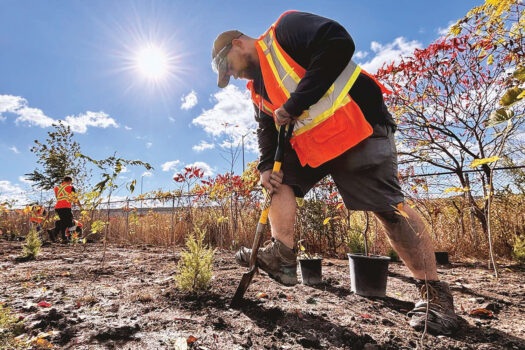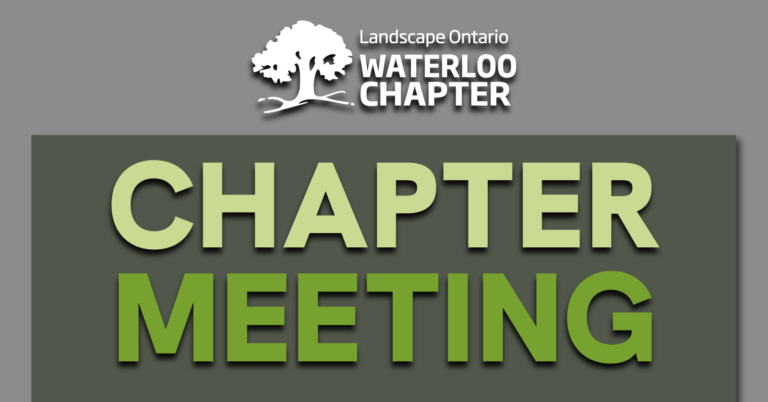Prosperity Partners Program Manager
 Last month, one of our Landscape Ontario Peer to Peer Network members, Lindsey Ross, President of Living Green Landscapes in Winchester, Ont., posted a deeply sincere and important message on the peer group’s private Facebook page. The day Lindsey posted his message was the one year anniversary of the suicide death of one of his employees. Lindsey’s message was clear: look after your staff, treat them well, listen to them, support them on a holistic level whenever you can, and build a culture where you watch out for, and take concern for each other.
Last month, one of our Landscape Ontario Peer to Peer Network members, Lindsey Ross, President of Living Green Landscapes in Winchester, Ont., posted a deeply sincere and important message on the peer group’s private Facebook page. The day Lindsey posted his message was the one year anniversary of the suicide death of one of his employees. Lindsey’s message was clear: look after your staff, treat them well, listen to them, support them on a holistic level whenever you can, and build a culture where you watch out for, and take concern for each other.
Lindsey is a Millennial. He is a perfect example of the paradigm shift emerging in Millennial-built teams and businesses over the past few years. Many business owners in our profession grew up with the industrial era mind-set that people in a business are a commodity to be managed in order to grow profit. The paradigm shift that’s now very evident in progressive business teams, is that money is the commodity to be managed, in order to grow the people. Author, motivational speaker, and organizational consultant, Simon Sinek, discusses this concept in great detail and with his thought-provoking style in his book, Leaders Eat Last.
It takes a dedicated entrepreneur, determined to grow their team and solve staffing issues, to realize how crucial this timely paradigm shift really is. It takes the intentional act of self-reflection as a first step to start shifting focus from what we can’t control (ie: the labour market), to focusing on what we can control (growing the people we have and attracting more like them).
I, personally, charged head-long through many formative and middle years running my own landscape company, focusing on profit, efficiency and top line growth. It took a major health event and a few weeks in hospital to finally snap me out of it. Only then did I experience the value of stepping back to get clarity and carve out a smarter path. Self-reflection was the key.
Self-reflection ensures the time for business owners and top level managers to contemplate rather than produce, to analyze rather than invent, and to stay present in daily affairs. There are lots of questions you can ask yourself and your team, which require a pause in default routines, as well as default activity. One of the most effective ways I’ve seen this process happen recently, is through management teams making the time to step away and hold a strategic thinking retreat.
There is a huge return on investment for making the time for a one- or two-day ‘think-tank’ style get-away. Sometimes an outside facilitator can listen and then offer a fresh perspective, along with helping to manage discussions when there’s disagreement or tension. With a little bit of preparation and structure, having a pause in the rapid fire pace of daily business can inspire self-reflection and allow great new ideas to surface. While it might seem like an expensive idea, ask yourself what it costs your company to NOT take hold of real issues and solve expensive problems (ie: lost opportunities in revenue from being short staffed, repeating the high cost of recruiting, training and onboarding a steady stream of new employees every year).
“Clarity Precedes Mastery.” I’ve mentioned this famous quotation many times before, and it’s worth mentioning again. In my experience, when a business is faced with chronic challenges, it’s time for clarity. You really can’t master anything if you don’t have total clarity on what the issues really are, what you can and can’t control, and what you can influence if you put your mind to it.
I’m proud to say that active members in our Landscape Ontario Peer to Peer Network have greater clarity on many levels of their business, now more than ever. And their success continues to grow on all levels of their business. At our Muskoka Summit last month, many in the group reported their employee turnover and recruiting issues have all but disappeared. Why? Because they’ve spent the past few years working together as peers, reflecting on their real-time business issues, delving into many key issues around people, profit and processes. They have emerged on the other side with what I believe is a higher than average rate of employee retention, engagement and growth.
Self-reflective activities work well to improve business results. Whether through focused facilitated discussion groups with your professional peers, or just with your own team, making the time to “step out of the box” on a regular basis brings a huge return on investment, both in time and money.
Jacki Hart may be reached at info.peertopeer@landscapeontario.com.








